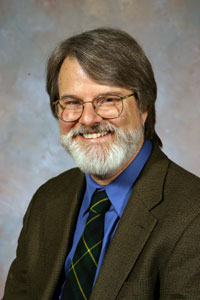Open source curriculum development is transforming the education community. DIY teachers all over the world are using open source course management systems, open access textbooks, and other open source tools. Unfortunately, educators are still finding it difficult to obtain developing technology because of corporate education software limitations. On Sunday, March 15th, the SXSWi panel, “Edupunk: Open Source Education,” will discuss the movement, its challenges, and its future.

Panelist W. Gardner Campbell has been involved in teaching and learning technologies for nearly two decades. He is the Director of the Academy for Teaching and Learning at Baylor University, and also serves as Assoc. Prof. of Literature and Media in the Honors College. Gardner also is a Fellow of the Frye Leadership Institute (2005), was chair of the Electronic Campus of Virginia from 2006 to 2008, and has served on program committees for both EDUCAUSE, and the EDUCAUSE Learning Initiative. He currently serves on the ELI Advisory Board (2007-2010).
Before the panel on Sunday, we were able to ask the edupunk panelist a few questions regarding the open source education movement.
Q: You teach, and have taught, subjects ranging from British Renaissance literature to new media. With a strong background in English, how did you become so involved with new media and technology?
A: I’ve actually published some of this story in a piece called “My Computer Romance,” available online.
Q: You have been involved with EDUCAUSE and the EDUCAUSE Learning Initiative. What can you tell our readers about EDUCAUSE and the importance of promoting the intelligent use of information technology?
A: In my view, EDUCAUSE has the largest strategic range of any organization in this field: everything from campus business systems to emerging technologies in teaching and learning. For me, EDUCAUSE is a community of practice and a community of learning, one in which I can see what I don’t yet understand and begin to move toward comprehension. In the EDUCAUSE Learning Initiative, I’ve found a focused, intense, and wide-ranging conversation about how teaching and learning technologies can transform education. I’ve made close friends, learned from others’ successes and disappointments, and found a network of resources that continues to inspire and educate me, every day. I can’t stress enough how fundamental these organizations are to my own learning, and how supportive they are of the communities they serve.
Q: What can you tell us about your panel of “edupunks” and how you hope to loosen the grip of corporate education software?
A: Well, it’s not my panel, but I know that’s not what you mean. 🙂 The folks on the panel with me are leaders in this conversation. We disagree about some things and agree passionately about many more. We’re diverse in our professional identities but alike in our fierce commitments–and our willingness to be in very intense conversations. It’s an honor to be on the program with them.
My prime strategy is to share the wonderful things that result from an open, small-pieces-loosely-joined approach to teaching and learning, and then to invite my colleagues in academia to figure out how to spread the joy and spread the word. A close second layer of strategy is curricular reform. I want to see rich opportunities for exploring the foundational texts of the computing and information age in every first-year experience and throughout the general education curriculum. To my mind, students who graduate without either reading or knowing they *should* read essays like “Augmenting Human Intellect” and “Computer Lib/Dream Machines” have not really been to school.
Q: It can be said that you represent the future of professors as an educator who embraces technology and pushes for the learning of new programs. New media can still be considered a fresh area for universities, how do you feel about the current university level educational system and new media’s place in it?
A: My specific answer is that these foundational writings are commonly called “obscure,” and I think that’s a disgrace. They should be as common, and as widely discussed, as anything else in the general education curriculum.
